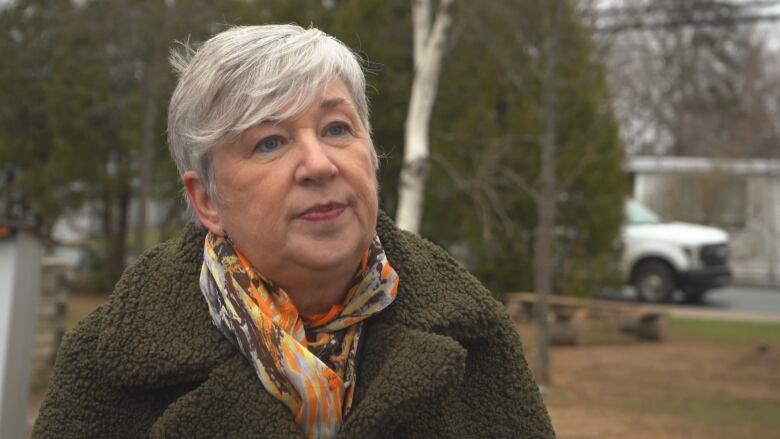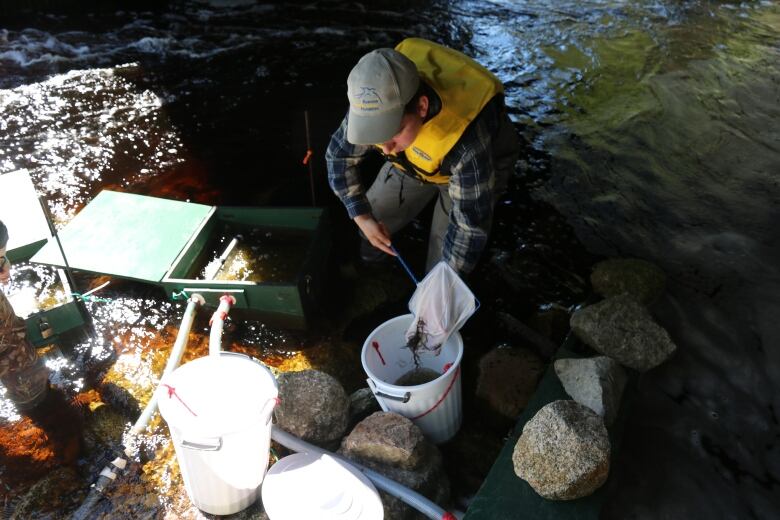Moderate livelihood negotiations to include elvers, says fisheries minister
'This is not just about lobster. This is about all species,' says Bernadette Jordan

The lucrative harvest of baby eels in Nova Scotia and New Brunswick is now part of negotiations to implement the Mi'kmaw treaty rightto fish for a moderate livelihood, says federal Fisheries and Oceans Minister Bernadette Jordan.
"This is not just about lobster. This is about all species. So, we are going to continue to work with them in negotiations to see if there is a way for them to exercise that right as well," Jordan saidTuesday.
Demands for a share of the commercial fishery by the Mi'kmaq have led to conflict in recent years, culminating in a ministerial order from Jordan that shut down the entire Maritime fishery in 2020.
The tiny baby eels known as elvers are flown live to Asian fish farms where they are harvested as adults. Most of the annual 9,960-kilogram quota is caught in Nova Scotia. In 2019, the fishery was valued at $38 million.
"An elver is not actually usually caught for a food species. It's caught to be grown out," Jordan said.
What caused the shutdown
The 2020 shutdown came after an unprecedented surge in Mi'kmaw harvesters fishing under food, social and ceremonial (FSC)licences.
Elvers caught from those licenses are not tracked, nor is the catch allowed to be sold.
DFO had no clear idea how many elvers were being landed by Mi'kmaw fishermen, but believed it exceeded commercial catches on some rivers, according to internal documents obtained by CBC News.
The department also believed that catch was being sold in international markets.
To stop the practice, DFO imposed a minimum-size requirementin February 2021 on all FSC eel licences issued in the Maritimes.
"We have to make sure conservation is the priority," Jordan said."The elver is a species we are very, very concerned about. The science is still very much in development with elvers, so we have to take steps to make sure that this is a sustainable fishery."
Conflict continues in 2021
Clipping the wings of the food, social and ceremonial fishery did not end conflict on rivers and streams when the season opened in March.
DFO says 14 peoplehave been arrested in connection with suspected unauthorized elver fishing so far this year. It's not clear if all individuals chargedwere Mi'kmaq, but several members of the Sipekne'katik First Nation were charged. In a confrontation posted to Facebook, they claimed they had a treaty right to fish for elvers.
The 1999 Marshall decisions affirmed the Mi'kmawright to fish for a moderate livelihood, subject to federal government regulation for conservation.
Unlike the dispute over the self-declared Mi'kmaw moderate livelihood lobster fishery which has generated sometimes violent opposition from commercial fishermen conflict over the elver fishery has been largely hidden.
Commercial elver-licence holders have said little about the issue,which has been intensifying since 2017 around the same time complaints over FSC lobster fishing emerged in Nova Scotia's St. Marys Bay.
Nine commercial licence holders, including theWe'koqma'q First Nationin Cape Breton, have exclusive rights to fish for elvers in Nova Scotia and New Brunswick.

In 2019, each licence was worth $4.3 million, according to a DFO economic assessment.
Each licence holder is assigned a certain number of rivers and a quota. Landings are tracked via logbooks and verified by dockside monitoring.
There have been no new licences issued since 1998.












_(720p).jpg)


 OFFICIAL HD MUSIC VIDEO.jpg)
.jpg)



























































































